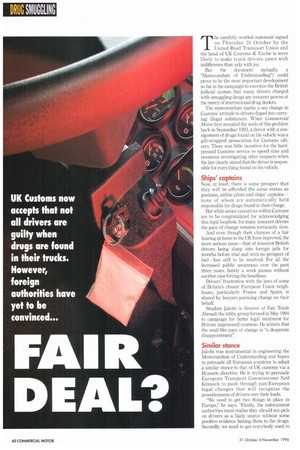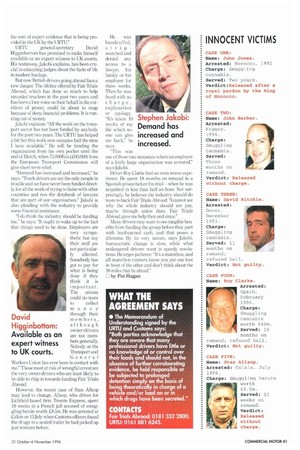Fik
Page 42

Page 43

If you've noticed an error in this article please click here to report it so we can fix it.
EI AL?
The carefully worded statement signed on Thursday 31 October by the United Road Transport Union and the head of UK Customs 8z Excise is more likely to make truck drivers yawn with indifference than yelp with joy.
But the document (actually a "Memorandum of Understanding") could prove to be the most important development so far in the campaign to convince the British judicial system that many drivers charged with smuggling drugs are innocent pawns at the mercy of international drug dealers.
The memorandum marks a sea change in Customs' attitude to drivers duped into carrying illegal substances. When Commercial Motor first revealed the scale of this problem back in September 1993, a driver with a consignment of drugs found on his vehicle was a gift-wrapped prosecution for Customs officers. There was little incentive for the hardpressed Customs service to spend time and resources investigating other suspects when the law clearly stated that the driver is responsible for everything found on his vehicle.
Ships' captains
Now, at least, there is some prospect that they will be afforded the same status as postmen, airline pilots and ships' captains— none of whom are automatically held responsible for drugs found in their charge.
But while senior executives within Customs are to be congratulated for acknowledging this legal loophole, for many innocent drivers the pace of change remains tortuously slow.
And even though their chances of a fair hearing at home in the UK have improved, the more serious issue—that of innocent British drivers being slung into foreign jails for months before trial and with no prospect of bail—has still to be resolved. For all the increased public awareness over the past three years, barely a week passes without another case hitting the headlines.
Drivers' frustration with the laws of some of Britain's closest European Union neighbours, particularly France and Spain, is shared by lawyers pursuing change on their behalf.
Stephen Jakobi is director of Fair Trials Abroad; the lobby group formed in May 1994 to campaign for better legal treatment for Britons imprisoned overseas. He admits that the snail-like pace of change is "a desperate disappointment".
Similar stance
Jakobi was instrumental in engineering the Memorandum of Understanding and hopes to persuade all European countries to adopt a similar stance to that of UK customs via a Brussels directive. He is trying to persuade European Transport Commissioner Neil Kinnock to push through pan-European legal changes that will recognise the powerlessness of drivers over their loads.
"We need to get two things in place in Europe," he says. "Firstly, the enforcement authorities must realise they should not pick on drivers as a likely source without some positive evidence linking them to the drugs. Secondly, we need to get everybody used to the sort of expert evidence that is being provided in the UK by the URTU."
URTU general-secretary David Higginbottom has promised to make himself available as an expert witness to UK courts. His testimony, Jakobi explains, has been crucial in educating judges about the facts of life in modern haulage.
But now British drivers going abroad face a new danger. The lifeline offered by Fair Trials Abroad, which has done so much to help stranded truckers in the past two years and has been a lone voice on their behalf in the corridors of power, could be about to snap because of deep financial problems. It is running out of money Jakobi explains: "All the work on the transport sector has not been funded by anybody for the past two years. The URTU has helped a bit but this work now occupies half the time I have available." He will be funding the organisation from his own pocket until the end of March, when 75,000Ecu (C60,000) from the European Transport Commission will give short-term relief.
"Demand has increased and increased," he says. "Truck drivers are not the only people in trouble and we have never been funded directly for all the work of trying to liaise with other countries and run the databank of lawyers that are part of our organisation." Jakobi is also pleading with the industry to provide some financial assistance.
"I do think the industry should be funding me," he says. "It ought to wake up to the fact that things need to be done. Employers are very sympathetic but say their staff are not particular ly affected. Somebody has got to pay for what is being done if they think it is important. The unions could do more to collect money through their members, although owner-drivers are not members generally. Nobody at the Transport and General Workers Union has ever been in contact with me." Those most at risk of wrongful arrest are the very owner-drivers who are least likely to be able to chip in towards funding Fair Trials Abroad.
However, the recent case of Stan Alison may lead to change. Allsop, who drives for Lichfield-based firm Twente Express, spent 10 weeks in a French jail accused of smuggling heroin worth £8.5m. He was arrested at Calais on 15 July when Customs officers found the drugs in a sealed trailer he had picked up just minutes before.
David Higginbotiom: Available as an expert witness to UK courts.
He was handcuffed, stripsearched and denied any access to a lawyer, his family or his employer for three weeks. Then he was freed with no charge, explanation or apology.
one of those rare instances where an employee of a fairly large organisation was arrested," says Jakobi.
Driver Roy Clarke had an even worse experience. He spent 18 months on remand in a Spanish prison before his n-ial— -when he was acquitted in less than half an hour. Not surprisingly, he believes the industry should do more to back Fair Trials Abroad: "I cannot see why the Whole industry should not pay, maybe through union dues. Fair Trials Abroad gave me help then and since."
Many drivers may want to see tangible benefits from funding the group before they part with hard-earned cash, and that poses a dilemma. By its very nature, says Jakobi, bureaucratic change is slow, while what endangered drivers want is speedy resolutions. He urges patience: "It's a marathon, and all marathon runners know you put one foot in front of the other and don't think about the 26 miles that lie ahead."
El by Pat Hagan




































































































































